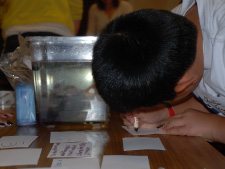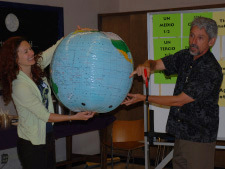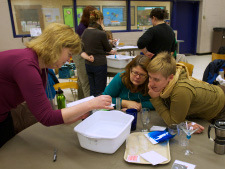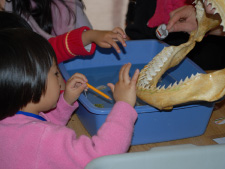2012 COSEE California Update| |  |
| Visitor to Lawrence Hall of Science engages
in a crayfish inquiry as UC Berkeley
student facilitates |
COSEE California (CA) has been busy partnering with other COSEE Centers and developing and disseminating a number of different programs and campaigns for audiences as varied as informal educators, faculty and research scientists, science undergraduate and graduate students, K-12 teachers and students, and Next Generation Science Standards Critical Stakeholders.
Physical Oceanography and Climate Science Professional Development and Broader Impact
COSEE CA has a long history of supporting researchers in developing “broader impact” plans for their research proposals. Recently, the value of this support in the larger context of COSEE CA’s relationship with San Diego Unified School District, a COSEE CA partner, became apparent as we embarked on the first in a series of broader impact funded professional development workshops focused on physical oceanography and climate science and directed at local earth, ocean and environmental science teachers. The workshop series, the Ocean-Climate Connection, has two primary goals: 1) creating a community of practice by providing a forum for earth, ocean and marine science teachers to collaborate with researchers on labs and activities for the district earth sciences program; and 2) tapping the research expertise at Scripps to provide district teachers with up-to-date knowledge of the fields of physical oceanography and climate science, and to create enduring connections to research at Scripps. This first workshop focused on global ocean circulation, and the connections between the ocean and earth’s climate – past, present and future.
Twenty-five high school and five middle school teachers attended the workshop. The workshop was comprised of a combination of district-led community building activities, plus science presentations, lab demonstrations, facilities tours, and informal discussions with Scripps scientists Lynne Talley, Julie McClean, Elena Yulaeva, and Dan Rudnick, graduate student Caitlin Whelan, and engineer Fernando Simonet. Scientists introduced the research behind our knowledge of global ocean circulation and our understanding of how the ocean impacts global climate. Participants learned how researchers use a variety of observational techniques to study global circulation and how climate modelers combine ocean, atmosphere and land observations to understand past climate as a basis for making projections into the future. Follow-up activities will include engaging a small group of interested teachers in developing labs and activities based on the workshop and on existing resources on teaching physical oceanography, such as the Teaching Physical Concepts in Oceanography published by The Oceanography Society and sponsored by COSEE.
 | |
Sylvia Vitzkova (George Mason University) and Claudio Vargas (Lawrence Hall of Science) doing "Apples and Oceans" during the COS Instructor's Workshop for faculty interested in offering this college course | |
COS Network
The Communicating Ocean Sciences (COS) Network (also known as COSIEN: Communicating Ocean Sciences Informal Education Network), funded by NSF ISE in 2009, leverages our successful COS partnerships, activities, and materials. These assets have been developed as part of our COSEE and ISE-funded COSIA projects for a distributed leadership nexus composed of regional hubs located at coastal and inland locations across the country.
The COS Network is creating a network of partnerships between informal science educators and faculty scientists across the nation to foster collaborations, support each other’s shared goals for promoting ocean/climate science literacy among the public, and meet their respective educational outreach needs. Partners across the Network assume leadership for adapting the COSIA (Communicating Ocean Sciences to Informal Audiences) college course to bring ocean literacy to inland areas, co-develop and document scientist workshops, offer an informal educator professional learning program (Reflecting on Practice), and expand the Network by bringing in new partners as they engage in Network programs. The project provides professional learning opportunities for informal educators as well as scientists interested in communicating their science research more effectively to the public and their students, and learning about the role of informal science environments in promoting the broader impact of their research. Two publications have resulted from this work (Halversen & Tran, 2010; Tran & Halversen, 2010).
Each of the Network partners has taken the helm to lead professional learning opportunities for informal educators, scientists, teachers, and young scientists (undergraduates and graduate students) to more effectively share their science with their respective audiences and develop more effective broader impacts. The range of universities and informal science education institutions have brought a diverse array of expert knowledge and experiences to share, as well as having opportunities to learn and develop their abilities to engage with the public. There are multiple entry points for new institutions to join the COS Network, including: Reflecting on Practice Informal Educator Professional Learning Coaching Workshops, Scientist Workshops, including an Online Interactive Workshops series in March-April 2012, and a social network and resources website COS-RoP.net.
Nationally, the COS Network is providing:
- Support for offering and teaching the COS/COSIA college courses.
- Professional learning opportunities for university and agency scientists interested in learning (a) how to communicate their science and research more effectively, and (b) about the role informal science education institutions can play in promoting the broader impact of their research.
- Professional learning opportunities for practicing informal science educators, grounded in research on learning, and centered on reflective practice and effective inclusion of diverse audiences. (See Reflecting on Practice below).
- Diverse role models and inquiry-based ocean sciences activities for underrepresented children and families visiting informal science education institutions nationwide.
- The next generation of educators and scientists - university students - with knowledge and experiences in science teaching, focused on science pedagogy in informal settings and the role informal environments play in supporting broader impact efforts.
National COSEE Network Centers that participate in leadership roles within the COS Network include: COSEE CA (LHS/UC Berkeley; Scripps/Birch Aquarium); COSEE-Pacific Partnerships (Oregon State University/Hatfield Marine Science Center), COSEE-West (University of Southern California/Aquarium of the Pacific), COSEE Coastal Trends (Hampton University/Virginia Aquarium), and COSEE NOW (Liberty Science Center/Rutgers University). These Centers are teaching the COSIA course, leading professional development programs for informal educators, and offering scientist workshops for university and agency scientists, and for Knauss Fellows.
| |  |
| Rita Bell and Mary Whaley (Monterey Bay Aquarium) along with Lindzy Bivings (California Academy of Sciences) engage in conversation around an activity during a Reflecting on Practice Coaching Workshop |
Reflecting on Practice
Reflecting on Practice (RoP) is a professional learning program for informal science educators developed at the Lawrence Hall of Science. The program immerses beginning and veteran educators in discussions about, reflections on, and applications of research and theory on learning and teaching science. There are three primary goals for the program:
- Build shared language and understanding through delving into the literature on learning and teaching.
- Engage practitioners in habits of reflections through observing their own teaching, as a means to develop their practice and make it public.
- Nurture a tradition of continued professional learning among participants, and build a professional learning community.
Reflecting on Practice aims to create and strengthen a shared pedagogical knowledge base and professional language, and make public the practices of all educators through greater understanding of, and reflections on, their beliefs, goals, and actions, thereby creating an atmosphere of ongoing reflective practice among educators from all levels at an institution. The program is designed to be modular and the topics of each module explore pedagogical and practical content pertinent to science educators’ practice in informal environments. There are 14 2.5-hour interactive sessions and numerous reflective tasks to explore the foundational knowledge of informal science educators’ practice. Currently, over 25 informal science education institutions have adopted the program. An RoP Coaching Workshop for institutions interested in implementing the program is offered at the Lawrence Hall of Science each December, and regional workshops are available in various locales including Virginia/North Carolina, Oregon, Los Angeles, San Diego, and New Jersey with others available upon request based on regional interest.
| |  |
| Young visitor examines shark teeth as UC Berkeley student facilitates |
Ocean Sciences Sequences
Funded by NOAA, and developed in partnership with the Lawrence Hall of Science, Rutgers University (COSEE NOW), and ocean, atmosphere and climate scientists across COSEE Centers, the Ocean Sciences Curriculum Sequences (OSS) are in-depth, kit-based curriculum units that deliver rich, standards-based content. Readily available instructional materials “kits” and student assessments allow OSS to be adopted by school systems and/or states as part of their regular, mainstream science programs. These materials provide teachers with standards-based tools for teaching inquiry-based science using the ocean as an integrating context and for improving science education and advancing ocean and climate literacy. They represent a major step toward achieving a coherent, comprehensive, nationally disseminated K-12 ocean and climate sciences curriculum. Each sequence focuses strategically on the core science concepts that students need to understand within a scientific discipline, and provides numerous opportunities for students to develop inquiry skills and abilities. Each session is designed to reflect the latest research on learning. Sequences provide students with carefully structured, highly engaging experiences with complex ideas over a sustained period of time
The Ocean Sciences Sequence for Grades 3-5 is off and running. (See February’s COSEE Network News for a review from Boston Public Schools). Our new Ocean Sciences Sequence for Grades 6-8: Exploring Climate Change and the Ocean Climate Connection is just back from the national field trial where 70 teachers taught the curriculum in 250 classrooms across the country. We are in the process of reviewing and analyzing the teacher feedback and student assessments and expect the curriculum to be published in early 2013. (Explore the OSS curriculum in more depth here.)
Next Generation Science Standards
COSEE CA is a national leader of the Ocean Literacy Campaign. After publishing and disseminating the Ocean Literacy Framework, including the Ocean Literacy Scope & Sequence for Grades K-12, COSEE CA has focused its efforts on ensuring that ocean sciences concepts from the Framework are well-represented in the Next Generation Science Standards (NGSS). COSEE and the National Marine Educators Association were accepted as an official NGSS Critical Stakeholder representing the Ocean Literacy Network. Our Critical Stakeholder group is comprised of Craig Strang (Chair), Lawrence Hall of Science/COSEE CA, NMEA President-elect; Cheryl Peach, Scripps Institution of Oceanography/COSEE CA; Lynn Tran, Lawrence Hall of Science/COSEE CA; Arthur Eisenkraft, UMass Boston, COSEE OCEAN; Lynn Whitley, University of Southern California/COSEE-West, NMEA Past-President; Diana Payne, Connecticut Sea Grant/COSEE-TEK, NMEA President; Carmelina Livingston, Einstein Fellow, National Science Foundation/COSEE SouthEast; Sarah Schoedinger, NOAA Office of Education/COSEE Council Ex Officio, NMEA Past-President; Peter Tuddenham, College of Exploration/COSEE CA and COSEE-West. This group is focusing its work on all three stages of the review of each draft of the NGSS: 1) review by the NGSS 26 Lead States; 2) review by Critical Stakeholders; and 3) Review by the public. So far, the group has developed and widely disseminated three messages to the ocean sciences and education community. To learn more about these messages and additional information on the NGSS click here.
References
Halversen, C. & Tran, L.U., Communicating Ocean Sciences to Informal Audiences: A scientist-educator partnership to prepare the next generation of scientists. The New Educator, 6:265–279, 2010.
Tran, L.U. & Halversen, C., Communicating Ocean Sciences: Partnerships to Prepare Young Scientists as Communicators. ASTC Dimensions, Nov/Dec 2010.
Visit COSEE California!

